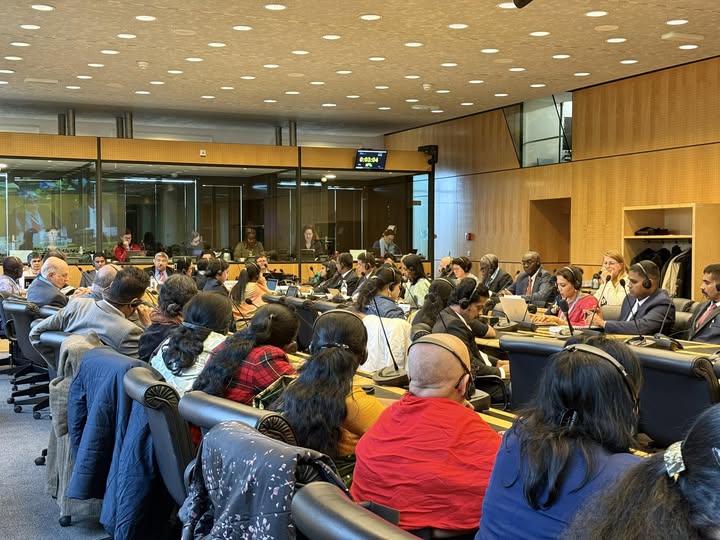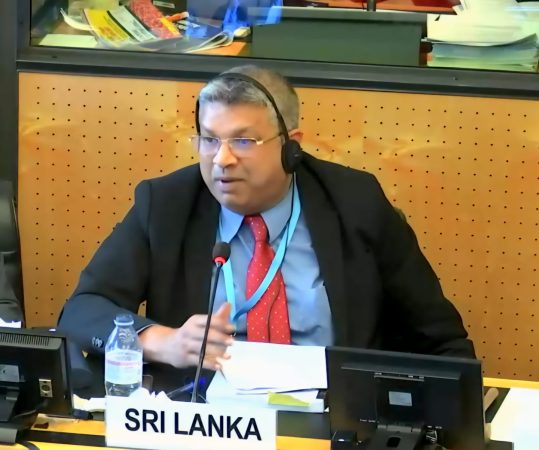The Committee on Enforced Disappearances today concluded its consideration of the initial report of Sri Lanka on its implementation of the International Convention on the Protection of All Persons from Enforced Disappearance. Committee Experts commended the State’s law transposing the Convention, while raising concerns regarding reports of arbitrary detentions and intimidation of victims’ families.
Olivier de Frouville, Committee Vice-Chair and Country Co-Rapporteur, said Sri Lanka had been particularly affected by enforced disappearance; there had been waves of disappearances in the 1980s and 1990s, and throughout the conflict period until 2009. He welcomed that the State party had taken some positive steps in response, ratifying the Convention, integrating it into national legislation, and establishing the Office on Missing Persons. The law on enforced disappearance was a good transposition of the Convention, he said.
Mr. de Frouville said there were several cases of arbitrary detention and “short-term” disappearances reported in recent years, including cases of people being taken in white vans and held in secret detention for extended periods. How did the State ensure that the police enforced the zero-tolerance policy for such detentions?
Carmen Rosa Villa Quintana, Committee Expert and Country Co-Rapporteur, said the families of victims of enforced disappearance were reportedly threatened with intimidation or surveillance by the State and, in some cases, police had refused to accept complaints. How did the State party ensure that victims’ families could submit complaints without fear of reprisals?
Introducing the report, Harshana Nanayakkara, Minister of Justice and National Integration and head of the delegation, said the International Convention for the Protection of all Persons from Enforced Disappearance Act of 2018 was enacted to give effect to the Convention and operationalise it domestically. This Act provided for an absolute prohibition of enforced disappearance.
On arbitrary detentions, Mr. Nanayakkara said the Human Rights Commission of Sri Lanka was mandated to monitor places of detention. This envisaged regular visits without prior notice to police stations, prisons, and childcare facilities. The delegation added that there were three cases of “short term” enforced disappearance currently being investigated by the Office on Missing Persons.
The police had a zero-tolerance policy on the suppression of complaints, the delegation said. Disciplinary action was taken against officers who refused to record complaints. There were free telephone lines and a website persons could use to lodge complaints to the inspector general. The national police commission also accepted complaints against the police.
In concluding remarks, Mr. Nanayakkara, said the Government believed in securing justice for the victims of enforced disappearance and finding truth and closure, in line with its commitment with human rights and fundamental freedoms. It heard the pain of missing citizens and their families and would continue to uphold its promises to them.
In his concluding remarks, Juan Pablo Alban Alencastro, Committee Chair, thanked the delegation and Committee Experts for their participation in the dialogue. The common goal of the Committee and the State party was to ensure implementation of the Convention in Sri Lanka. The Committee worked with all States parties, victims and stakeholders towards the eradication of enforced disappearance.
During the meeting, newly appointed Committee Expert Yakouma Jean de Dieu Bambara (Burkina Faso) made his solemn declaration.
The delegation of Sri Lanka consisted of representatives of the Ministry of Justice and National Integration; Ministry of Foreign Affairs, Foreign Employment and Tourism; the Ministry of Defence; Ministry of Public Security and Parliamentary Affairs; Ministry of Women and Child Affairs; the Attorney General’s Department; Sri Lanka Police; the Department of Probation and Child Care Services; National Child Protection Authority; the Office on Missing Persons; the Office for Reparations; the Office for National Unity and Reconciliation; and the Permanent Mission of Sri Lanka to the United Nations Office at Geneva.
The Committee will issue its concluding observations on the report of Sri Lanka at the end of its twenty-ninth session, which concludes on 2 October. Summaries of the public meetings of the Committee can be found here, while webcasts of the public meetings can be found here. The programme of work and other documents related to the session can be found here.
(OHCHR)

